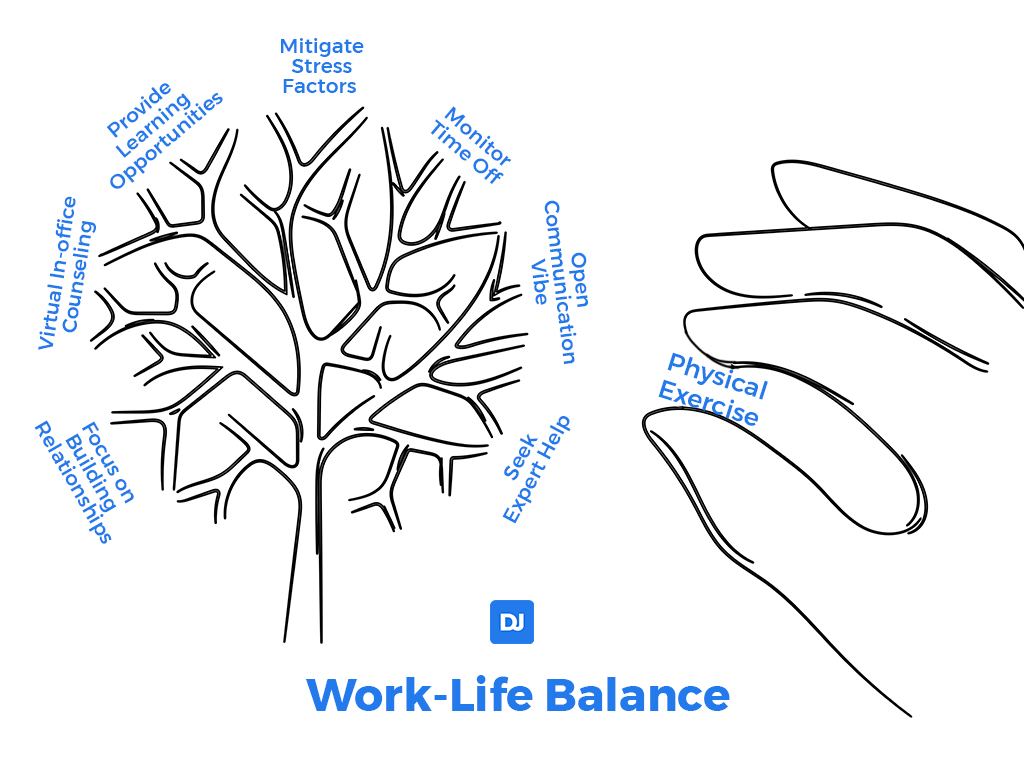Tech burnout is one of the leading causes of high attrition rates in the industry today. With developers often facing intense workloads, tight deadlines, and the expectation to always be on the cutting edge, burnout has become a significant factor that drives talented professionals away.
It’s not just about the workload—developers need a supportive environment that fosters well-being, growth, and a sense of purpose. Creating a workplace where developers feel valued, have opportunities to solve challenging problems, and maintain a healthy work-life balance can significantly reduce burnout.
Why is Work-Life Balance Important to Avoid Burnout?
Burnout is a reality for thousands of remote workers across the globe. And software developers are no exception.
DigitalOcean’s report highlights that 66% of remote developers experienced burnout symptoms. In the United States, the record jumps up to 82%.
The most popular burnout causes are:
- Lack of control over work agreements
- The feeling of not doing enough as a remote worker
- A disorganized workplace
- Increased anxiety due to deadlines
According to the same report, the risk of burnout is 2% higher for remote developers than for in-house employees. However, with the right instruction, remote work can lead to a better work-life balance, especially for remote developers. The same report shows how those working remotely rate their work-life balance at 7.02 out of 10; on average – on-site developers score lower at 6.95.
To keep your performance high and stable, you have one secret strategy: teach your remote developer how to achieve a better work-life balance. We’ve got some ideas to add to your Manager Toolkit to help you do just that.
Factors Contributing to Software Developers’ Stress and Burnout
Software Developer Burnout symptoms are similar to post-traumatic stress. According to scientific research, the core symptoms of burnout are:
- Emotional exhaustion
- Depersonalization
- Reduced personal accomplishment
In the long run, these feelings lead to loss of purpose, tiredness, and, most importantly, indifference towards deadlines and responsibilities.
In 2015, three Harvard professors developed a mathematical model to calculate the impact of work stress on health. According to their results, burnout causes 120,000 deaths only in the US. It also costs about $190 billion dollars in healthcare expenses, which is 8% of the national expenditure. Companies like General Motors spend more on healthcare than on steel!
But what causes burnout?
Blind conducted a survey that revealed tech employees considered poor leadership and unclear direction the top reasons for stress. When team leads cannot give proper guidance or communicate project specs to developers, their efforts become futile.
Other factors leading to high stress include:
Workload
Remote staff are often given more freedom in terms of when they do work than their office-based counterparts, and for some employees, that can lead to taking on too much, which leads to extended work hours – in fact, 55% of remote staff work more than their contracted hours.
Managing workloads means being more proactive when your team are remote.
When you work in the same office, you can see the obvious signs of stress in a colleague, but unless you make time to check in every day, you can miss them with a remote team. Make sure that you check in regularly with your staff, or you could be on the road to team burnout.
Fear of Missing Out (FOMO)
This is a two-fold issue; the first is that working from home means less face time with management and less recognition for the work you do. The second is just generally missing out on the social side of the company, building relationships and a support network in the company that makes life easier.
To address this, you need to make sure that the contribution of your remote team is understood and recognized. This can start with onboarding; organize virtual introductions to all the people you would usually get to meet a new starter. Make sure that remote staff get included in the internal phone directory and are included in newsletters etc.
You also need to represent your team and raise their profile whenever possible. Name check them in meetings, shout them out on the company intranet, and nominate them for employee of the month.
Over-Collaboration
The flip side to the problem above is including your developers in meetings they don’t need to be at.
A change of pace can be nice every now and again to prevent coder burnout, and you certainly need to have regular contact both individually and as a team to keep everything on track (daily stand-ups, for example), but too many meetings are distracting, demoralizing, and can lead to burnout.
It isn’t just meetings, though. Consider who needs to include on cc lists for emails, who needs to be tagged on updates to jobs in your task management systems, and who needs to be included in chats on Microsoft Teams or Slack channels.
How to Teach Work-life Balance To Your Remote Programmer?
Here are some ideas to create a culture of work-life balance for your remote developers:

1. Mitigate Stress Factors
If their sources of stress remain constant, your developer’s emotional health will suffer too.
To avoid this, keep in regular contact with your team so you know what their workloads are like and what roadblocks they might be experiencing.
The daily stand-up meeting from the Agile Development Methodology is good for this, giving everyone a chance to talk about what they’re working on, where they are stuck, and what’s coming up next.
2. Monitor Time Off
Some staff aren’t great about taking time off.
You’ll know the ones; they usually end up either carrying over or losing a chunk of vacation time at the end of the year. Be proactive in checking in with your team and suggesting they take some time off – and make sure you build all vacation time into your workload planning, so it’s possible.
3. Provide Learning Opportunities
The number one benefit developers seek from their jobs is the opportunity to learn and grow.
In the past, this has been an issue with remote developers, who have been overlooked regarding training courses or personal development.
With most courses now available online, there’s no excuse for this now, so make sure you take time during the annual appraisal to identify any training needs or wants and provide them for your team.
4. Open Communication Vibe
A corporate culture based on openness can’t be replaced with business models.
Especially during meetings, create an open communication vibe to share feedback and bottlenecks.
Letting remote employees speak freely about what’s bothering them can make them feel more involved and accepted. More importantly, they feel comfortable speaking out when they can cope with tasks and arrange a better workload with the rest of the team.
The best way to encourage this is to listen when you get feedback, even if it feels like a criticism of you as a manager, and take steps to address problems. It may take time to build trust, but it is definitely worth the investment.
5. Consider Virtual In-office Counseling
Often a manager or team lead just isn’t qualified to offer better guidance from a psychological point of view. That’s why many businesses have in-house corporate counselors.
Remote developers and team members should also have access to counselors who can help them lead happier lives and perform better at work.
5. Seek Expert Help
Developers or project leaders don’t learn about work-life balance at school. The assumption that they can simply wing it leads to grave problems. Workshops, seminars, and webinars can teach remote employees work-life balance and how to sustainably contribute to a company over the long term.
6. Focus on Building Relationships
Developers or project leaders don’t learn about work-life balance at school.
The assumption that they can simply wing it leads to grave problems. Workshops, seminars, and webinars can teach remote employees work-life balance and how to sustainably contribute to a company over the long term.
7. Encourage Physical Exercise
A study from the American Cancer Society noted that prolonged sitting (6-8 hours) increases the mortality rate by 19%. The health journal, Lancet suggested that 60-75 minutes of intensive physical exercise can alleviate that risk.
Promoting physical exercise within the company through gym allowances has found success with other remote companies but even with no budget, you can do this and build team spirit by taking part in virtual challenges – you can even raise money for good causes at the same time.
Incentivize Work-life Balance to Prevent Developer Burnout
Incentivizing breaks sounds counterintuitive but leads to better results.
Encourage your staff who take breaks to share pictures or experiences, whether it’s a dramatic shot taken on a hike or a video clip from their kid’s dance recital. Value the whole person and not just the work product they create.
The health and happiness of employees are a direct reflection of the company itself. And is directly related to employee productivity. Taking measures to ensure employee well-being is an important step in safeguarding the company’s long-term success. To see how we can help, contact.





